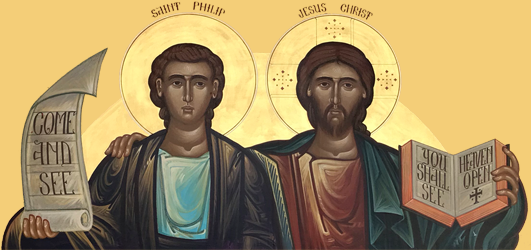“In the Beginning God made heaven and earth. The earth was invisible and unfinished: and darkness was over the deep. The Spirit of God was hovering over the face of the water.” Genesis 1:1-2 (OSB)
So begins the Biblical Narrative, and thus, so begins our story as God’s creatures and as God’s people. From the first words of Scripture, we are confronted with the impossibility of truly understanding anything about ourselves and our world apart from God the Creator as our reference point.
As the Fathers are keen to point out, too, the Trinitarian nature of God is already revealed in outline here. We see the Father who creates “all things visible and invisible”; we see the “Beginning” of God’s creation which can be read as both a temporal reference point or, in a higher sense, as the Person of Wisdom, Christ himself (Prov 8.22 LXX; Jn 1.1; Rev 3.14), who is the divine Agent of the Father’s creative acts; and we see the Holy Spirit brooding over the primordial waters as “a bird cover[s] the eggs with her body and impart[s] to them vital force from her warmth” (St. Basil, On the Six Days 2.6 [NPNF2 8.63]; Deut 32.11).
It is fitting to begin our year of reflections on the Law with this passage because of its harmony with the Feast today of Our Lord’s Theophany in the Jordan River. It is as we look back from Theophany that we can clearly see the God of Genesis 1 as the Trinity. Similarly, we see the deep connection in the economy of salvation between creation and salvation (as “new creation”), and how these are unified in Christ’s person and work. Just as creation was “born” from water, as it were, by the Spirit, so also our own rebirth and the renewal of all creation is prefigured in our Savior’s baptism and emergence from the water, with the descent of the Spirit upon him.
In the expression, “heaven and earth,” Scripture unfolds to us the stage on which the whole biblical drama will be played out, with creation as both spectator and participant. And we are presented with the two horizons which frame our existence such that we might always be reminded of our nature both as finite creatures of the dust of the earth and as divine image-bearers who were formed to participate in heavenly life and have “eternity in” our “hearts” (Eccl 3.11). The human, as we will see, is called to be a priestly mediator between these two realms, offering creation back to God in thanks and glory.
For further reading & reflection:
St. Basil the Great’s On the Six Days of Creation (http://www.ccel.org/ccel/schaff/npnf208.viii.ii.html)
~ By Reader Justin Gohl

